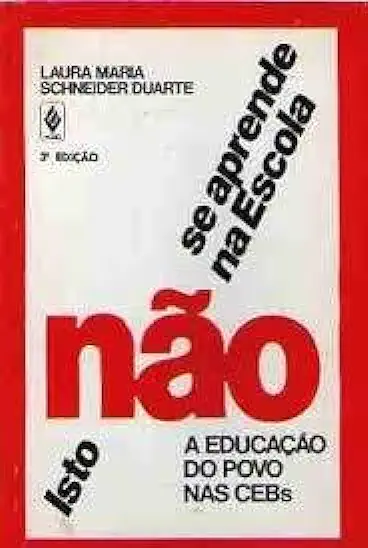
This is not learned in school - the education of the people in the CEBs - Laura Maria Schneider Duarte
This is not learned in school - the education of the people in the CEBs
Book Summary
In "This is not learned in school - the education of the people in the CEBs", Laura Maria Schneider Duarte offers a unique perspective on the transformative power of education within the context of the Christian Base Communities (CEBs) in Brazil. Through a comprehensive analysis of the educational practices and experiences of the CEBs, Duarte unveils a profound and liberating form of education that goes beyond the confines of traditional schooling.
A Journey of Liberation and Empowerment
The book embarks on a compelling journey into the heart of the CEBs, where education is not merely a transfer of knowledge, but a transformative process that empowers individuals and communities to critically engage with their reality, challenge oppressive structures, and work towards social transformation. Duarte vividly portrays how the CEBs create spaces for dialogue, reflection, and collective action, fostering a sense of agency and self-determination among the marginalized and oppressed.
Education as a Praxis of Liberation
Drawing upon Paulo Freire's concept of "praxis," Duarte demonstrates how the CEBs employ a participatory and dialogical approach to education, where learners are not passive recipients of knowledge, but active participants in the construction of their own understanding and transformation. Through popular education methodologies, the CEBs engage individuals in critical reflection on their lived experiences, enabling them to identify the root causes of social injustice and develop strategies for collective liberation.
Empowering the Marginalized
One of the central themes of the book is the emphasis on empowering the marginalized and excluded sectors of society. Duarte highlights how the CEBs prioritize the education of women, peasants, and other marginalized groups, providing them with the tools and knowledge to challenge oppressive systems and claim their rightful place in society. Through case studies and personal narratives, the book illustrates the transformative impact of education in empowering individuals to overcome poverty, discrimination, and social exclusion.
Building a Just and Equitable Society
"This is not learned in school" underscores the profound role of education in building a just and equitable society. Duarte argues that the CEBs' educational practices contribute to the formation of a critical consciousness, enabling individuals to recognize and challenge the structures of domination and exploitation that perpetuate social inequality. By fostering solidarity and collective action, the CEBs empower communities to work towards systemic change and the creation of a more just and humane society.
A Call to Action
Duarte's book serves as a powerful call to action, urging readers to embrace the transformative potential of education as a tool for liberation and social change. She invites educators, activists, and change-makers to draw inspiration from the CEBs' educational practices and incorporate them into their own work, contributing to the construction of a more just and equitable world.
Conclusion
"This is not learned in school - the education of the people in the CEBs" is a must-read for anyone interested in transformative education, social justice, and the power of collective action. Laura Maria Schneider Duarte's insightful analysis and compelling narrative offer a profound understanding of how education can empower individuals and communities to challenge oppression, build solidarity, and work towards a better world.